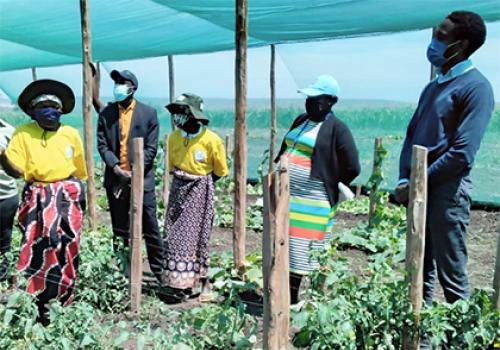A group of 15 small-scale farmers, comprising 11 women and four men, in the Baca-Baca community in Mafuane, Namaacha district of Mozambique, has benefited from the Climate Smart Technologies agriculture project launched in December 2020 by the Centre for Coordination of Agriculture Research and Development for Southern Africa (CCARDESA) in collaboration with SADC Secretariat with support from the European Union under the Global Climate Change Alliance Plus (GCCA+) programme.
The Mozambique project is one the four projects launched by CCADESA, with technical support from Bembani Group, to mitigate the impact of COVID-19 on food and nutrition security using Climate Smart Technologies. The other three are in Eswatini, Zambia and Zimbabwe. CCARDESA was founded by SADC Member States to harmonize the implementation of agricultural research and development in the SADC Region
The projects are an extension of the Global Climate Change Alliance Plus (GCCA+) programme which seeks to strengthen the capacity of SADC Member States to undertake regional and national adaptation and mitigation actions in response to the challenges caused by the effects of climate change.
The EU has contributed €8 million to the GCCA+ project to increase the capabilities of SADC Member States to mitigate and adapt to the effects of climate change, and to have their voices better heard in the international climate change negotiations.
The project will directly and indirectly benefit approximately 150 people.
Project Management Officer, Mr Luis Edgar Francisco Huamusse, said the farmers have 0.75 hectares under maize, planted 2 000 heads of cabbage, 1 850 onions, 800 tomato plants, and one hectare of cucumber, beetroot, and lettuce in a greenhouse. The crops are in the development phase and in good condition while 5 000 heads of cabbage will be transplanted on a quarter of a hectare outside the greenhouse.
The project uses gravity irrigation system which has been installed to draw water from Rio Movvene for irrigating the crops.
Mr Huamusse said the communities around the project are responding positively to the project, becoming fully involved in the production process. Potential markets for the produce from the project have already been identified locally in the towns of Boane and Namaacha, in the city of Matola and in Maputo.
“We also have potential markets in neighboring countries such as Eswatini and South Africa,” he said.
The farmers have been provided with technical support to use climate smart techniques and practices to produce 20 tonnes of vegetables per year and improve income generation and market access in local communities and beyond, including management of pesticides to control pests and diseases.
As a way to build an inter-dependent ecosystem relationship, the project seeks to build two build fishponds, one for hatching and one for fattening the fish. The project is also planning to extend into eggs production by rearing layers chicken. Plans are underway to build an aviary with a capacity for 1000 laying hens.
There also plans to build the capacity of the beneficiary farmers in climate smart agricultural and resilience technologies, sustainable management, and enhance their capacity on cooperatives.
COVID-19 has caused a humanitarian crisis, negatively impacting the food and nutrition status of millions of households worldwide. The escalating threat on livelihoods, food and nutrition security due to increasing cases, lockdowns and health-related restrictions calls for urgent interventions to minimise the impact to the most affected communities.

